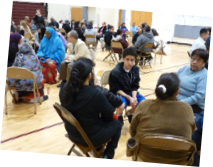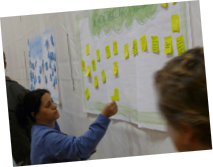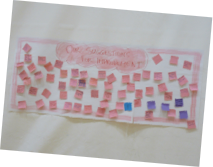Earlier this week I was on a first phone call with Debra Kreisberg, Joseph Nsabimbona, and Angeline Habonimana Nsabimbona. Debra was a a participant at an Art of Participative Leadership training a month ago in Utah. I appreciate her invitation to explore some community engagement work that she is involved in. Joseph and Angeline, whom I was meeting for the first time, are a married couple whose work is to support refugee populations in the Denver, Colorado area. Joseph and Angeline left Burundi in 1994. They are founders of A La Source Refugee Ministry.
The point of this call was to explore ways to help Joseph and Angeline with their work. I listened to them. Their work is inspiring, particularly oriented to serving refugees from the Great Lakes area of East Africa. They focus on youth, asylum seekers, and organizations that deal with refugee populations. Their format is what you would expect — training classes, forums, and seminars. Joseph and Angeline, like many others, are trying to imagine next ways for helping people get to the heart of the work. What they do is great. What they want to do is reach more people, scale their work. Yet, in scaling it, not lose the heartfulness of it. This is where Debra wanted to make the connection. She had felt and seen this at the Art of Participative Leadership training she participated in.
I appreciated in particular the clarity of story that we arrived at on the phone together. Or key points of the story that help their work now.
- Together We Are Stronger — This is the belief that Joseph and Angeline expressed. As well as variations of it: “Together we are better.” I offered the African proverb that I heard long ago. “If you want to go faster, go alone. If you want to go further, go together.”
- In Coming Together We Partake of that Strength — This is a fundamental belief in the value of coming together. And I believe it is one of the core questions that Joseph, Angeline, and Debra are asking: How can we experience the power of together in a way that lasts? This is different than just hearing the words, inspiring as they may be. And this is where I feel I can be helpful with them, offering social technologies and participative formats that entangle the group heart if you will, or the group imagination.
- Harvest Commitment — It is great to focus immediately on what we intend to harvest. Commitment is part of that. Appreciation is another. As powerful as it is, we don’t come together just to hear the strength of story and appeal to compassion. We invite and welcome that energy to move into the qualities of deeper relation and action.
- Make it Better — There are many of us who continue to adopt an energy of saving the world. I continue to learn patience to just make it better. I say this hear because many of the worlds that we are living in require a lot. There is a trap (of utter exhaustion for one) in expecting to save the world. Or to make it perfect. My friend Margaret Wheatley is a great teacher for me of these traps, reminding me that the spiritual warrior’s way is to do good because it is ours to do.
- Our Greatest Resource Is Each Other — Debra has a very strong voice on this. It is a call to reclaim the belief that human beings are resourceful. This contrasts some of the last several decades of a welfare model and disposition. I love the way that she challenges beliefs of scarcity of currency to abundance of human beings in relation with each other.
Serving better. Getting to the heart of it through well-held social engagement and interaction with each other. Inspiring.


 We then moved our evening into two rounds of cafe style questions. The first, inviting participants to share stories with one another about what they appreciate in this community, and what they know is a challenge. We harvested these. The second round was an invitation to share suggestions for improvement. Again we harvested these.
We then moved our evening into two rounds of cafe style questions. The first, inviting participants to share stories with one another about what they appreciate in this community, and what they know is a challenge. We harvested these. The second round was an invitation to share suggestions for improvement. Again we harvested these. This is a fundamental principle of working in living systems. We created the format for interaction — in play and in conversation — that can create conditions for well and thriving community. And it was a lot of fun.
This is a fundamental principle of working in living systems. We created the format for interaction — in play and in conversation — that can create conditions for well and thriving community. And it was a lot of fun.